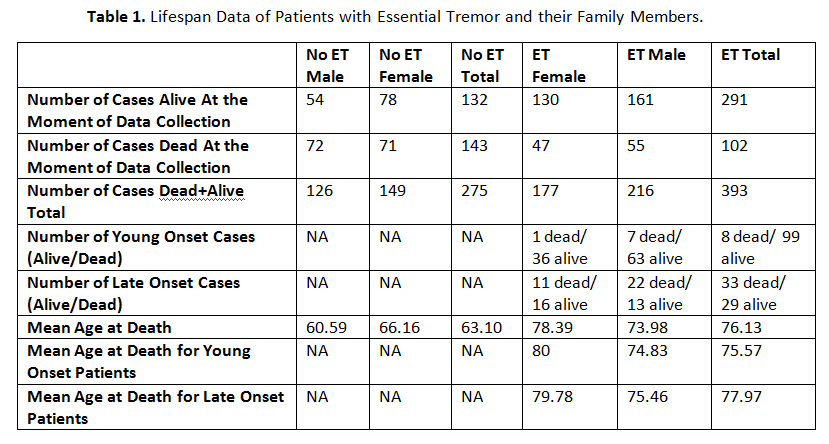Session Information
Date: Tuesday, June 6, 2017
Session Title: Tremor
Session Time: 1:45pm-3:15pm
Location: Exhibit Hall C
Objective: The objective of this study is to compare the lifespans of patients with essential tremor (ET) with their relatives.
Background: Essential tremor is a movement disorder commonly manifesting as action tremor of the hands and the head. There is growing evidence for a hypothesis which points to longevity in ET. But there are several recent studies reporting shorter life expectancy in ET.
Methods: Present data was initially gathered for a study done to determine a genetic link to familial ET. We used the information on ET patients we had at hand and their relatives totaling to 670 individuals (326 females, 48.8%) from 64 families.
Results: Average age of death for ET patients was 76.13 years, and for cases without ET was 63.10 years. Average age of death of patients with young (0-20 years), intermediate (20-50 years), and late onset (50+ years) were 74.00, 76.27 and 76.81 consequently. Women without ET died at the age of 66.16 years (n=71), and men at the age of 60.59 years (n=72) on average. Average ages of death for cases with ET were 78.39 years for females (n=47), and 73.98 years (n=55) for males (Table 1)
Conclusions: Essential tremor of any age of onset could lead to longevity compared to their healthy family members, with an average of 13.03 years of improvement in lifespan. The data we have support the theory that ET patients live longer than their healthy relatives regardless of gender or their age of onset.
To cite this abstract in AMA style:
C. Akbostanci, K. Doğanyiğit, M. Şen, E. Onat, A. Tekinay, T. Özçelik, M. Akbostanci. Patients with Essential Tremor Live Longer than their Relatives [abstract]. Mov Disord. 2017; 32 (suppl 2). https://www.mdsabstracts.org/abstract/patients-with-essential-tremor-live-longer-than-their-relatives/. Accessed April 15, 2025.« Back to 2017 International Congress
MDS Abstracts - https://www.mdsabstracts.org/abstract/patients-with-essential-tremor-live-longer-than-their-relatives/

